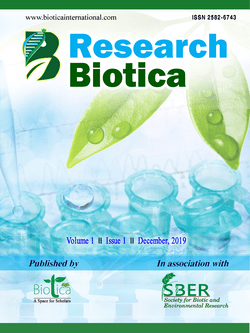
Indigenous Alcoholic Beverage 'Chakti' of High Altitude Bhotiya Community of Chaudans Valley of Kumaun Himalayas
Sunil Joshi
G.B. Pant National Institute of Himalayan Environment and Sustainable Development (GBPNIHESD), Kosi-Katarmal, Almora, Uttarakhand (263 643), India
Puja Bhojak
G.B. Pant National Institute of Himalayan Environment and Sustainable Development (GBPNIHESD), Kosi-Katarmal, Almora, Uttarakhand (263 643), India
Neha Thapliyal
G.B. Pant National Institute of Himalayan Environment and Sustainable Development (GBPNIHESD), Kosi-Katarmal, Almora, Uttarakhand (263 643), India
K.V. Satish
G.B. Pant National Institute of Himalayan Environment and Sustainable Development (GBPNIHESD), Kosi-Katarmal, Almora, Uttarakhand (263 643), India
Kapil Bisht
G.B. Pant National Institute of Himalayan Environment and Sustainable Development (GBPNIHESD), Kosi-Katarmal, Almora, Uttarakhand (263 643), India
Poonam Mehta
G.B. Pant National Institute of Himalayan Environment and Sustainable Development (GBPNIHESD), Kosi-Katarmal, Almora, Uttarakhand (263 643), India
Vaishali Joshi
G.B. Pant National Institute of Himalayan Environment and Sustainable Development (GBPNIHESD), Kosi-Katarmal, Almora, Uttarakhand (263 643), India
Vikram Singh Negi
G.B. Pant National Institute of Himalayan Environment and Sustainable Development (GBPNIHESD), Kosi-Katarmal, Almora, Uttarakhand (263 643), India
K. Chandra Sekar*
G.B. Pant National Institute of Himalayan Environment and Sustainable Development (GBPNIHESD), Kosi-Katarmal, Almora, Uttarakhand (263 643), India
Sumit Rai*
G.B. Pant National Institute of Himalayan Environment and Sustainable Development (GBPNIHESD), Kosi-Katarmal, Almora, Uttarakhand (263 643), India
DOI: https://doi.org/10.54083/ResBio.1.1.2019.01-04
Keywords: Bhotiya, Chaudans valley, Kumaun Himalaya, Thymus linearis, Traditional alcoholic beverage
Abstract
The traditional foods and beverages are an indicative of the simplicity and uniqueness of the life of tribal people living in close proximity of nature as well as each other. One such community is the Bhotiya tribe of Uttarakhand residing in the high altitude Indian Himalayan Region, known globally for its ethnic knowledge and traditional practices. They have old age traditions of producing indigenous alcoholic beverages. The present study undertakes one such practice of preparing a traditional drink called ‘Chakti’ using a wheat-based ethnic starter culture ‘balma’ having Thymus linearis (Jungali ajwain) as the main ingredient. The traditional drink is not only a part of their household or societal ceremonies and festivals but is a source of nutrition as well as income generation and livelihood. Furthermore, there is a need of assessment and documentation of these traditional beverages in terms of quality so as to with the aim of preserving indigenous knowledge as well as utilise it accordingly.
Downloads
not found
Reference
Bashir, R., Zargar, O., Parvaiz, Q., Hamid, R., 2019. In vitro antiproliferative activity of Thymus linearis essential oil from five ecozones of Kashmir valley. The Pharma Innovation Journal 8(4), 205-210.
Chakravarty, J., Sharma, G.D., Tamang, J.P., 2013. Indigenous technology for food processing by the tribes of Dima Hasao (North Cachar Hills) district of Assam for social security. In: Food and Environmental Foods Security Imperatives of Indigenous Knowledge System. (Ed.) Das Gupta, D. Agrobios, Jaipur, India. pp. 32-45.
Franz, C.M.A.P., Huch, M., Abrioue, H., Holzapfel, W., Galvez, A., 2011. Enterococci as probiotics and their implications in food safety. International Journal of Food Microbiology 151(2), 125-140. https://doi.org/10.1016/j.ijfoodmicro.2011.08.014.
Kishor, K., Tewari, L.M., Tewari, A., Upreti, B.M., 2013. Traditionally fermented alcoholic beverages of high altitude Bhotiya tribal community in Kumaun Himalaya, India. African Journal of Food Science 7(12), 508-510. https://doi.org/10.5897/AJFS2013.1071.
Kumari, A., Pandey, A., Ann, A., Raj, A., Gupta, A., Chauhan, A., Sharma, A., Das, A.J., Kumar, A., Atri, B.L., Neopany, B., 2016. Indigenous alcoholic beverages of South Asia. In: Indigenous Alcoholic Beverages of South Asia. 1st Edition. (Ed.) Joshi, V.K. CRC Press, New York, USA. pp. 501-596.
Tamang, J.P., 2010. Diversity of fermented beverages and alcoholic drinks. In: Fermented Foods and Beverages of the World. 1st Edition. (Eds.) Tamang, J.P. and Kailasapathy, K. CRC Press, Taylor & Francis, Boca Raton, FL. pp. 85-125.
Targais, K., Stobdan, T., Mundra, S., Ali, Z., Yadav, A., Korekar, G., Singh, S.B., 2012. Chhang - A barley based alcoholic beverage of Ladakh, India. Indian Journal of Traditional Knowledge 11(1), 190-193.
